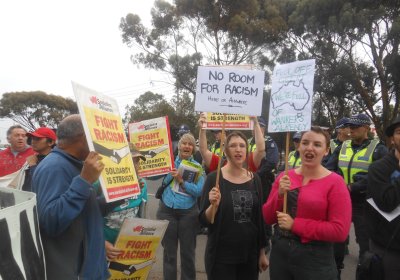The London School of Economics (LSE) was occupied by students on March 17. The occupation, still going as of March 28, has since spread to King's College London, University of Arts London and Goldsmiths University of London.
More than 100 students took over the school, which has been associated with neoliberal economic theory for decades, and declared that the central university administration building has been transformed into the Free University of London.
Netherlands
Geert Wilders called off his February 20 public meeting in Perth after the hotel where he was going to speak cancelled his booking.
Organisers of Wilders' tour tried to claim that protesters had intimidated the hotel and implied that Wilders' "free speech'' was threatened as people were "denied'' the chance to hear Wilders talk.
Wilders' most prominent supporter in the Australian parliament — disgraced Liberal senator Cory Bernardi — also tried to claim that there was "free speech double standard" involved.
In an attempt to avoid anti-racist protesters, the February 18 meeting to launch the Australian speaking tour of Dutch far-right politician Geert Wilders, was, at the last moment, moved to a desolate, non-residential part of Somerton on Melbourne’s northern edge. More than 200 anti-racists, however, picketed Wilders’ meeting while another 100 protested in Melbourne CBD, where one of the speakers was Greens Senator Richard Di Natale.
Exit polls have shown the Dutch Socialist Party will get 15 seats after the September 12 elections, the same number it had before.
When two weeks ago, with polls showing the SP stood to win about 35 seats, even The Economist felt the need to raise the alarm over SP-leader Emile Roemer's “far-left party”. With this fresh in the memory, that's a deep disappointment for Dutch leftists. But it shouldn't come as much of a surprise.
The statement below was released by the Dutch Socialist Party on September 12.
* * *
A combative Emile Roemer addressed hundreds of Socialist Party members in the Paard van Troje (Trojan Horse) venue in The Hague. The SP held on to its 15 seats, despite a fiercely fought two-horse race between the PvdA (Labour Party) and the VVD (centre-right liberals).
“Yes,” said Roemer, “I am extremely proud of this party and of the million people who voted for us.
Although parliamentary elections are often billed as “historic”, and results hailed as “landslides” and “political earthquakes”, events usually turn out not to have been so dramatic once the dust settles. But the September 12 national election in the Netherlands really does seem to be living up to the rhetoric.
- Previous page
- Page 2



